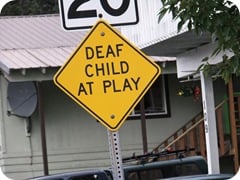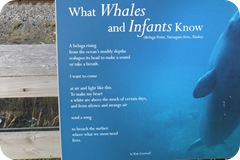
(click on the photo to enlarge and read)
There is a part in me that objects to the question I myself have just posed. Being on vacation, traveling (or doing something totally different from ones daily activities) is important to any person’s well being. There is no need to translate everything into classroom terms – I believe that a happier teacher is a better teacher!
And yet…
I saw the sign above, with the poem, on the very first day of our family trip to Alaska. Beluga Point was our first stop after leaving Anchorage. I found that the poem “stuck with me” throughout the trip, because it connected to the very strong sense of awe I felt while visiting Alaska. We are not intrepid backpackers who spend a week in a tent in the rain or hike in inaccessible areas. We stayed in cabins or B&B’s with hot showers and went on hikes on familiar trails.
Nonetheless we had awe inspiring experiences.
Not only are the vistas along the roads stunning, the close encounters with glaciers incredible, the bald eagles whizzing past majestic (and of course there are the bears and the moose!) consider experiences such as the following:
* On a guided boat ride in Kenai Fjord we saw humpback whales collaborating together in what is called bubble-net feeding. They all exhale at the same time and create a bubble that sucks in the fish.
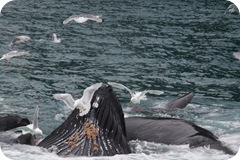
* On a small hill next to the B&B we were staying at, we saw (at close range!!!) a herd of about 400 caribou migrating from their calving area to their winter area. The next morning we saw them fording the river.
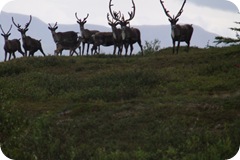
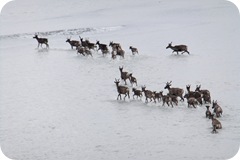
So, I think it is clear why the feeling I feel the strongest from this trip is a sense of awe.
If I want to think in classroom terms I need to define what is it exactly I want to share with my students and a sense of awe regarding nature is not a very clear definition to work with.
I’ve had an unsuccessful experience with travel tales in the past.
A year and a half ago our youngest son went on an amazing youth trip to the ANTARCTIC! After our son returned, he made a slide show and lectured in different classes at his high-school. In the slide show you could follow the stages of his long journey on the map, see icebergs, penguins and life on the boat. So, I decided to create a suitable worksheet (with answers to be found in the slideshow) in easy English for my pupils and bring it to class. The level of general knowledge and world geography knowledge is pretty low in many of my high-school groups of deaf and hard of hearing students.I had hoped that the fact that this is a true story about my own son would capture the student’s interest and something about the Antarctic might sink in.
The results were mixed. Some pupils did react as I had hoped. But others basically only reacted to the fact that the teacher’s son was lucky enough to get a full scholarship and THEY would never be so lucky (luck, yeah, my son found the organization himself, filled out forms, wrote essays, got recommendations, got the scholarship only the second time round, but for them it was like winning the lottery). They weren’t interested in the rest at all.
So, any suggestions (beyond sneaking some of these photos into online worksheets) on what to do in the classroom with my strong sense of awe of the natural wonders of Alaska?

